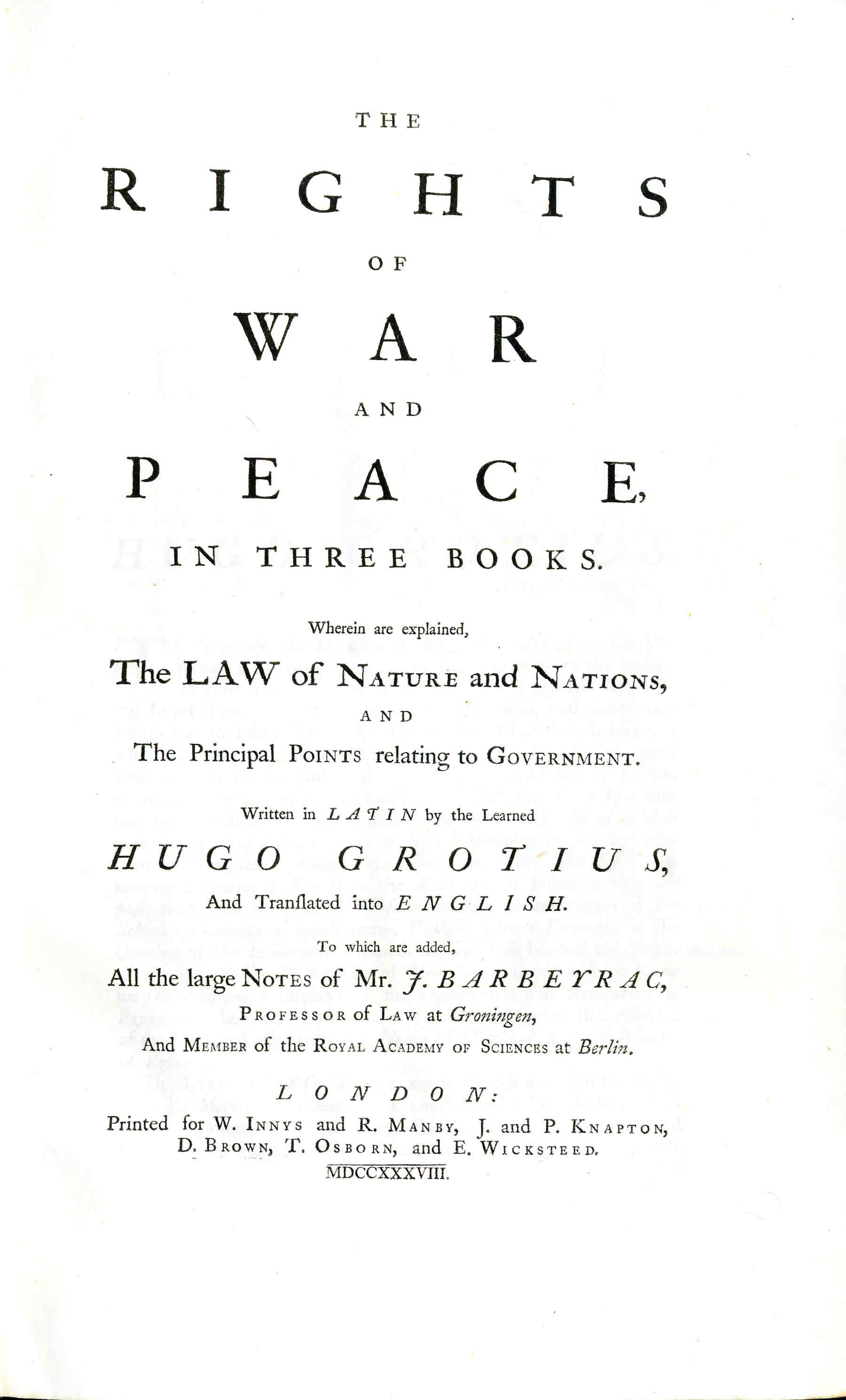The Rights of War and Peace, in Three Books: Wherein are Explained, the Law of Nature and Nations, and the Principal Points Relating to Government
by Hugo Grotius
| The Rights of War and Peace | |
|
Title page from The Rights of War and Peace, George Wythe Collection, Wolf Law Library, College of William & Mary. | |
| Author | Hugo Grotius |
| Translator | Jean Barbeyrac |
| Published | London: Printed for W. Innys and R. Manby, J. and P. Knapton, D. Brown, T. Osborn, and E. Wicksteed |
| Date | 1738 |
| Edition | Third English edition |
| Language | English |
| Pages | 817 [i.e. 813, 1] |
| Desc. | Folio (35 cm.) |
| Location | Shelf M-5 |
Hugo Grotius (1583-1645) is often touted as the "Father of International Law."[1] Grotius influenced thinkers like John Locke with his ideas of international law as natural law, or principles derived inherently from the human nature or human reason.[2] Grotius also wrote extensively on maritime law and the law of war.
In his three-book set De Jure Belli ac Pacis (The Rights of War and Peace), first published in 1625, Grotius maintains that natural law principles are universally binding on all people. The first book defines war and outlines circumstances when it is justifiable.[3] The second classifies just causes for war, including self-defense, reparation of injury, and punishment.[4] The concluding book questions the rules of war and how they are universally binding.[5] Together, Grotius' books present a theory of just war, delineating between jus ad bello and jus in bello, or just causes of going to war and justice in war respectively.
Evidence for Inclusion in Wythe's Library
Listed in the Jefferson Inventory of Wythe's Library as Grotius and given by Thomas Jefferson to James Dinsmore. While the precise title and work are unknown, it is highly likely that Jefferson's notation refers to a copy of The Rights of War and Peace. Brown's Bibliography[6] and George Wythe's Library[7] on LibraryThing both include the 1738 English title based on a copy sold at auction in 1881 which contained George Wythe's bookplate.[8] The Wolf Law Library purchased a copy of the same edition.
Description of the Wolf Law Library's copy
Bound in recent period-style quarter calf over marbled boards with raised bands and a lettering piece on the spine. The endpapers have been renewed. Purchased from The Lawbook Exchange, Ltd.
Images of the library's copy of this book are available on Flickr. View the record for this book in William & Mary's online catalog.
See also
References
- ↑ Sean Murphy, Principles of International Law, (Minnesota: Thompson West, 2006), chap. 3.
- ↑ Jeremy Waldron, God, Locke, and Equality: Christian Foundations in Locke's Political Thought, (Cambridge: Cambridge University Press, 2001), 189.
- ↑ Miller, Jon, "Hugo Grotius," The Stanford Encyclopedia of Philosophy (Fall 2011 Edition), Edward N. Zalta, ed.
- ↑ Ibid.
- ↑ Ibid.
- ↑ Bennie Brown, "The Library of George Wythe of Williamsburg and Richmond," (unpublished manuscript, May, 2012) Microsoft Word file. Earlier edition available at: https://digitalarchive.wm.edu/handle/10288/13433
- ↑ LibraryThing, s.v. "Member: George Wythe", accessed on June 28, 2013.
- ↑ Catalogue of the Choice and Extensive Law and Miscellaneous Library of the late Hon. William Green, LL.D., … to be sold by Auction, January 18th, 1881, at Richmond, VA. (Richmond: John E. Laughton, Jr., 1881), 65 "645. Grotius (H.). The Rights of War and Peace, with notes of J. Barbeyrac. Folio. London: 1738. Armorial book plate of George Wythe."
